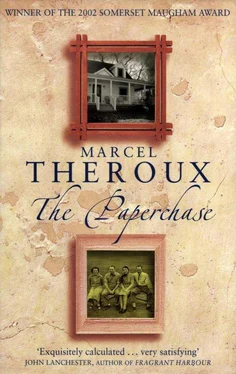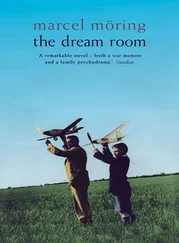There was barely a month between the diagnosis and her death. I remember being taken to see her for the last time when she was gravely ill in hospital. I sat on the side of her bed and she said, ‘Damien, your father is a very silly man. Remember that, and love him anyway.’
My other vivid memory of her is of seeing her crying one day by the kitchen window. When I asked her why, she said, ‘There are some things little boys shouldn’t know about.’ I’m still trying to figure out what she might have meant by that.
My father sold the house in Sussex soon after she died. He couldn’t bear to stay there and be reminded of her. Anyway, I think a stately pile was more his cup of tea than a Sussex bungalow.
After Mum died, home became school and friends, and secondarily the detached house on the south London street where I grew up. But the visits to the States continued, and were a glimpse, every summer, into a glamorous parallel universe. We stepped off the plane in London at the end of each summer deaf from flying, and the accents of the immigration officials and cabbies grated, and going back to boarding school felt like beginning a stretch in Wandsworth Prison, which stood forbiddingly at the end of the Common and overlooked the garden centre and haunted my dreams. All the same, London was home.
There was little misery and no privation in our house. Perhaps there was a chilliness; perhaps Vivian and I suffered from the want of a mother. Well, we obviously did. But I can’t say I noticed it then. Dad was a remote and rather austere figure — more so after my mother died — but he had enough money to pay for a succession of au pairs, whom we terrorised, and then to send us away to a school where we boarded even though it was barely five miles from home. Boarding school, with its unrelieved maleness, its emphasis on competition, and its intolerance of difference and sensitivity, was just an extension of my family life. I got teased about my father, who arrived for a parents’ evening wearing plus-fours at a time when I was too small and insecure to laugh it off. But I toughened up, made friends and generally developed the false consciousness of adolescence that’s quite as bad as the one your family foists on you.
A couple of teachers stand out from my schooldays. Herbert Chinn, who taught Classics, reportedly believed electricity was a fluid and put tape over the sockets each night, like that woman in the Thurber story, to prevent it leaking on to the carpet. Mr Hepplewhite, the physics master, announced to each class before he began the syllabus that he did not believe in molecules. He once spent an entire lesson showing us the correct way to fold a jacket. He wore silver sleeve holders and was obsessively tidy, but the backs of his shirts were full of holes. I stayed behind after one lesson and said: ‘Mr Hepplewhite, if you don’t believe in molecules, how do you explain everything?’ He looked at me and said, ‘Ah, March!’ and then carried on with whatever he was doing. I wish I could say this bubble of benign madness protected him well into old age, but shockingly he was killed by a rent boy about five years after I left the school.
I was a mediocre student, although my father cherished the belief that both Vivian and I were highly talented. He had great hopes of our following him into the Law, which he managed to capitalise just by the way he said it. One of his fondest fantasies was to pretend that we had in fact already qualified as lawyers. It was flattering and touching, and I colluded in it when he discussed his business with us. ‘I’d like to pick your legal brain on something, Damien,’ he would say, and proceed to mystify me with juridical terminology, as though I were a forty-year-old lawyer, instead of a fourteen-year-old schoolboy struggling to achieve average marks in any of my subjects. ‘I sure could use your mother’s help on this one,’ he would add sadly, although her understanding of corporate law had probably been only slightly more sophisticated than mine.
Looking back now, I think he was probably lonely, and thinking out loud, and trying to involve us in the only part of his life where he felt he had any competence. But that interpretation was beyond me then, and I felt ashamed of my father and almost protective towards him.
As a result, I had a secret life of vice which he was unaware of, involving cigarettes, drinking and futile excursions to West London to buy spliff. It all came painfully out into the open some time before my fifteenth birthday. One weekend, I was picked up by the police, drunk, at midnight, in Earl’s Court station. The friend I was with had panicked and left me, passed out, on the platform. My father had to collect me from the police station in the middle of the night. I vaguely remember the dials of the dashboard doubling and quadrupling before my eyes.
The next day was one of the longest of my life. I was consumed with remorse, and even my tears had an alcoholic tang to them. My father didn’t speak to me for two weeks. I don’t think he had the first idea what to do, poor man.
Dad’s solution to my waywardness was, even by his standards, spectacularly bad. He decided that he hadn’t been setting enough of an example to me — that I needed to learn that hard work would bring results in my world as they did in his.
One weekend, I came home to find that Dad had started studying Latin with a tutor called Mr Sandford, an old boy of my school who can only have been about twenty-three and had a tiny blond moustache that looked like it should have been attached to a gerbil’s arse. He insisted on addressing Vivian and me in Latin. If we bumped into him in the hall he would say: ‘Salvete, pueri .’ And Vivian and I would always reply: ‘All right, Mr Sandford,’ like a pair of barrow boys.
I can only guess that Dad thought that the sight of him conjugating semi-deponent verbs would encourage me to work harder. He couldn’t have been wronger. Around this time, I had to go back to the police station to receive a bollocking from one of the officers, who talked about ‘boys with your opportunities’ and the anxiety I was causing my father. He even brought up my mother’s death; a manipulation that no one had been ruthless enough to try on me before. He made me feel that being middle class meant I had no right to be unhappy, so I assumed I wasn’t.
In my opinion, this is a common fallacy. Middle-class people have paid for the relative safety of their lives by forfeiting the idea that their vicissitudes qualify as suffering. We are not supposed to be a wounded people. We are not cast in tragedies. We are cast in comedies and farces; we are found on running tracks with our silly blond wigs fluffed up by the wind beside us. There is no Hamlet, Chartered Surveyor of Denmark, no Mr Lear. A middle-class ‘tragedy’ is being run over wearing dirty underwear.
Real, raw life always seems to be somewhere else: in palaces or shanty towns, not among the clipped hedges of SW18. You can weep your heart out at the sight of the young princess’s coffin being wheeled by on a gun carriage — even a pauper’s grave is somehow full of pathos and terror. But I always had the impression that when middle-class people die, someone just slides us into a filing cabinet, and our silly bodies stink and decay and finally defeat a lifetime’s attempts at hygiene.
But, let’s face it, the human heart comes in a standard size. No one has a monopoly on misery. Obvious to you, perhaps; but the chief disaster of my life has been my inability to recognise when I was unhappy.
At some point, Dad really started to enjoy studying Latin. He was a much better student than I was. I wanted to be in a band, and get stoned and chase girls around west London. Dad was assiduous. He worked his way through the set texts, read up on Roman culture, and took Mr Sandford on a week’s holiday to Pompeii, which I only avoided by deliberately giving myself food poisoning with a plateful of raw haddock.
Читать дальше












